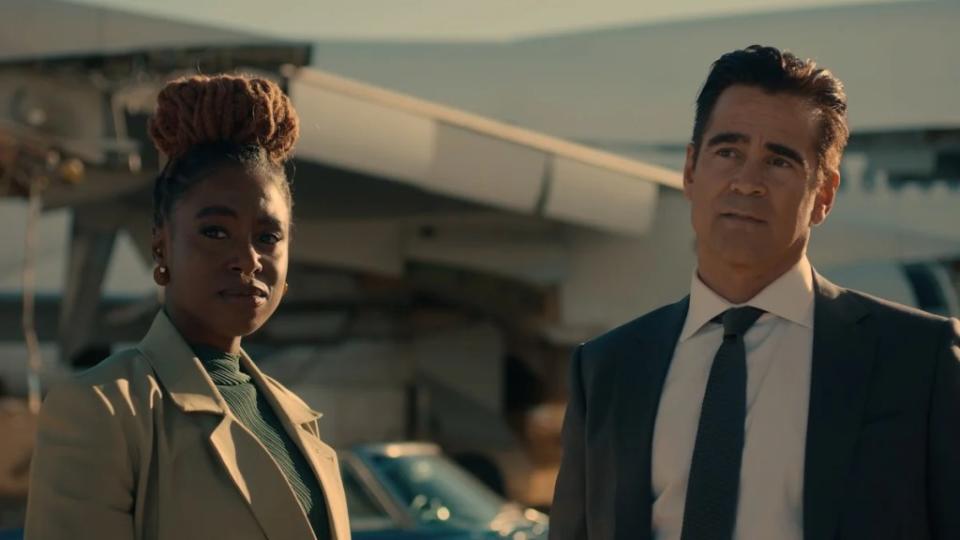‘Sugar’ Review: Colin Farrell Plays a Film Nerd Detective in Beguiling Apple Series
It’s been a fascinating year so far for TV-sized riffs on Los Angeles noir, with multiple series moving these archetypal stories forward in time while experimenting with how many of their throwback elements can remain intact. In “Monsieur Spade,” Clive Owen played a later-in-life version of Dashiell Hammett’s Sam Spade, relocated to the South of France in the early ‘60s. Now the Apple TV+ series “Sugar,” created by screenwriter Mark Protosveich, brings the genre all the way up to the present — maybe in some ways into the future — through a hero who constantly looks back.
John Sugar (Colin Farrell) doesn’t particularly embody an older, tougher style of masculinity to match his crisp threads and gorgeous blue convertible. In fact, he’s downright soft-spoken, enough that the barest hint of Farrell’s Irish lilt occasionally emerges from his dialogue, making his American accent sound all the gentler. Sugar is a multilingual man of the world, and can kick ass when he needs to; we first see him in a black-and-white scene in Japan, helping to retrieve a kidnapped child with brutally efficient force. But he feels particularly at home in Los Angeles because he’s a film buff, which “Sugar” communicates not through constant verbal references (though there are a few) but a stream of old movie clips cut into the action, like a less schticky version of the old HBO show “Dream On.”
Sugar returns to Los Angeles for a case involving Olivia Siegel, the missing granddaughter of film producer Jonathan Siegel (James Cromwell). Olivia’s father Bernie (Dennis Boutsikaris) is still in the picture (and in the pictures), but he’s convinced that Olivia has simply given in to her addiction issues and gone on a bender — Jonathan isn’t so convinced. The family’s Hollywood connections give Sugar plenty of people to question, including Olivia’s half-brother David (Nate Corddry), attempting a comeback with a sequel to a years-ago success; veteran rock star Melanie Mackie (Amy Ryan), who has addictions of her own; and Stallings (Eric Lange), a menacing figure on the fringes of these more famous names.

The actual case of Olivia’s disappearance isn’t especially complicated by noir standards, though at least it’s drawn out by punchy 35-minute episodes and stylish asides, rather than languid prestige-TV pacing. But Sugar himself, as played with a kind of open-hearted opacity by Farrell, holds secrets of his own. Why, for example, does he have a handler (Kirby Howell-Baptiste) with such a homey, welcoming little bungalow, with other professionals coming and going like it’s a bed and breakfast? And is he romantically attracted to Melanie, or just protective of her? Why does he seem at least as hell bent on finding Olivia as anyone in her actual family, if not moreso?
Structurally, the way some of these questions are answered — and the way that they set up what might happen in a possible second season — makes these first eight episodes of “Sugar” feel a bit like an extended pilot, like something that an older network show would have tied up in under two hours before sending Sugar on future cases of the week.
That’s not uncommon for streaming shows; more surprising (and further exacerbating that extended-pilot feeling) is that marquee director Fernando Meirelles (best known for the Oscar-nominated “City of God” and “The Constant Gardener”) sticks around for almost every episode, lending the show a distinct visual language, particularly in its editing. Conversations proceed through jumpy cuts to unusual angles or echo through cross-cut sequences, with scenes sometimes bleeding into each other. It’s not as antsy or adrenalized as some of the director’s movies, but it gives the show a distinctive rhythm less dependent on performances — which are uniformly strong, but also on the muted side. (Corddry is an exception, amusingly pathetic and grasping as the unpleasant David, though he’s perhaps not wildly convincing as a guy who was once a movie star, however briefly.)
Meirelles so clearly defines the show’s look and style that when he suddenly dips out for a single, penultimate episode, his absence is immediately apparent — also a rarity in series television, where directors often adhere to a house style. Is this absence itself a stylistic gambit for a crucially plot-heavy episode, a way of halting the show’s more impressionistic tendencies for half an hour or so? It’s hard to say, because “Sugar” is such a strange show, albeit often beguilingly so. It’s singular enough to avoid competing with other TV series — a mixed blessing, because that leaves it competing with the classic movies it keeps splicing into the narrative, an unfair comparison that the show itself keeps forcing. By the end of the show’s first season, it’s hard to say whether you’ve seen something brain-lighting in its cleverness, or screenwriter-brained in its daftness.
Would a second season get to the good stuff, or spoil the weirdness with more answers? For now, as in the middle of a good noir, that uncertainty is part of the fun.
“Sugar” premieres Friday, April 5, on Apple TV+.
The post ‘Sugar’ Review: Colin Farrell Plays a Film Nerd Detective in Beguiling Apple Series appeared first on TheWrap.

 Yahoo News
Yahoo News 
